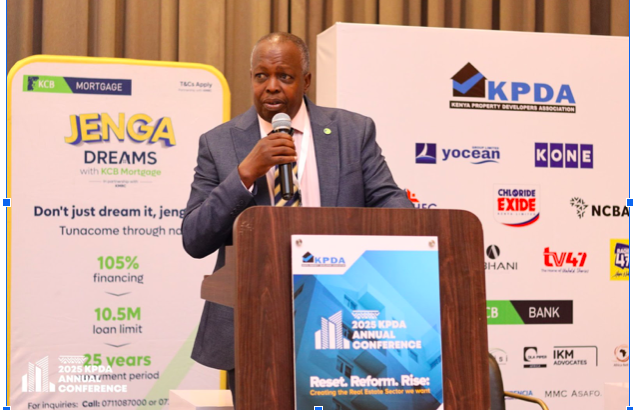
A few weeks ago, different players in the real estate industry gathered in Westlands to discuss and dissect issues related to sustainable design, decentralized infrastructure management, and the institutionalization of developers to unlock affordable capital.
The theme of the 2025 edition of the Kenya Property Developers Association (KPDA) conference was “Reset, Reform, Rise: Creating the Real Estate Sector We Want.”
“Reset means acknowledging that the old ways of doing things cannot take us forward. Reform means instituting systemic change. Rise means building a sector that is not only profitable but also inclusive, green, and globally competitive.” Ken Luusa, Chairman of the KPDA said in his opening remarks.
The ensuing discourse swirled around domestic macroeconomic pressures and global dynamics affecting investment into East Africa, structural weaknesses in planning, approvals, and corporate governance. It also included practical technologies and high-quality material standards crucial for modern construction, capital mobilization, and the preferred development model for managing Kenya’s rapid urbanization.
Kenya cannot continue to build a modern skyline on shaky economic and regulatory ground.
Reset: Facing Economic and Structural Realities
The conversation began with a sober reflection on Kenya’s operating environment. While the economy continues to show resilience with steady growth and a strong construction outlook, stakeholders highlighted that frequent tax policy shifts and unpredictable regulations continue to cloud investor confidence.
Participants called for predictable frameworks that can outlive election cycles and allow developers to plan long-term. The sentiment was clear: Kenya cannot continue to build a modern skyline on shaky economic and regulatory ground.
Reform: Building Systems that Work
Reform was the heartbeat of the day. Discussions focused on structural weaknesses in approvals and corporate governance, areas that often slow projects or inflate costs. Developers and policymakers stressed the need to streamline approval processes, improve inter-agency coordination, and enforce planning standards prepared by qualified professionals.
Panelists also explored how better governance within real estate firms and professionalized management structures could unlock investor confidence. It was a call to move from personality-driven ventures to sustainable, institutionally guided enterprises.
Rise: Innovation, Inclusion, and Sustainability
The “Rise” sessions brought energy back into the room, shifting from problems to possibilities. Speakers showcased practical technologies, PropTech innovations, and sustainable construction solutions redefining modern development.
Crown Paints, for instance, highlighted their ongoing transition toward environmentally safe products, completely removing harmful substances from their paints and embracing green certification. Smart infrastructure players such as Yocean Group discussed solutions aligned with KPLC’s shift to bulk smart metering, ensuring fair billing and transparent utility management in apartment complexes.
Women Leading the Future
A powerful highlight of the day was the session on “Women in Real Estate Development – Leadership, Equity, and the Business Case for Inclusion.” The discussion underscored that gender inclusion isn’t a side note, it’s a business advantage.
Panelists discussed the persistent challenges women face in accessing capital, networks, and leadership roles, while spotlighting partnerships like Crown Paints and Buildher that are actively bridging these gaps. The message resonated strongly: when women rise, the entire industry rises with them.
Financing the Next Chapter
Capital mobilization took center stage as experts discussed how developers can access affordable financing. The Kenya Mortgage Refinance Company (KMRC) was highlighted as a key step forward, enabling local banks such as HFC, KCB, and NCBA to provide long-term, fixed-rate mortgages below 10%.
Master Planned Communities (MPCs) have also emerged as a practical solution to Kenya’s rapid urbanization. By combining housing, infrastructure, and green spaces under strong governance, MPCs offer a sustainable model for accommodating the country’s 4.3% annual urban growth rate.
As the conference came to a close, one message stood tall: Kenya’s real estate sector is ready to evolve, but evolution will demand discipline, collaboration, and consistency. Stakeholders agreed that the future lies in predictable policies, responsible development, and inclusive leadership.
To reset means letting go of outdated systems. To reform means creating new structures that work. And to rise means doing so together—building not just properties, but a more transparent, inclusive, and sustainable future for Kenya’s real estate industry.
Lulu Kiritu is a Content Manager & Public Relations Specialist at BuyRentKenya, a real estate firm that connects people to property across Kenya.






